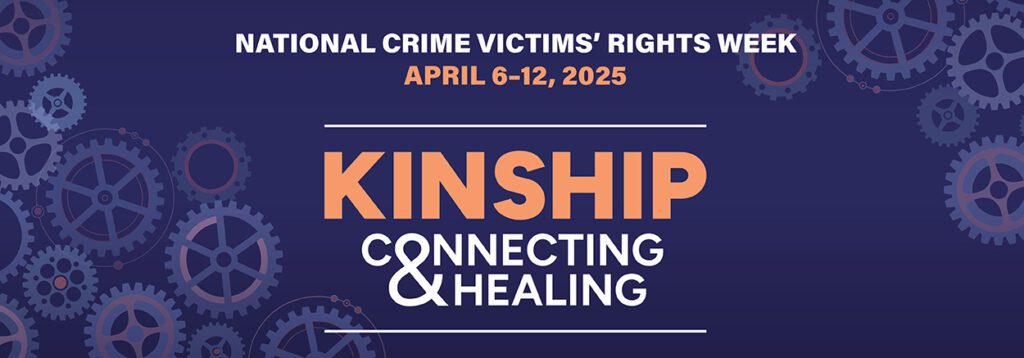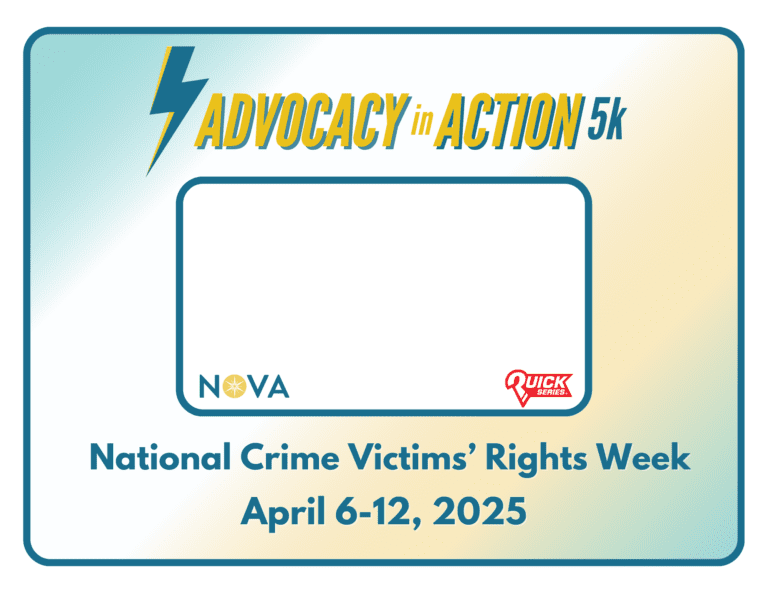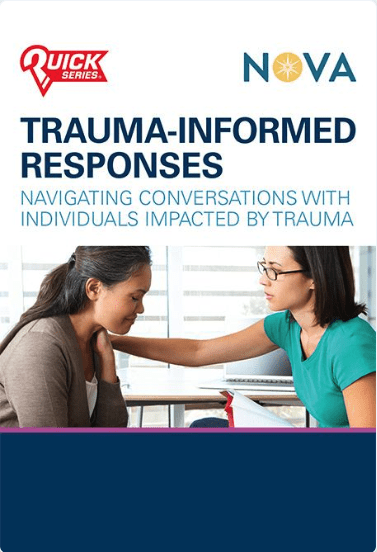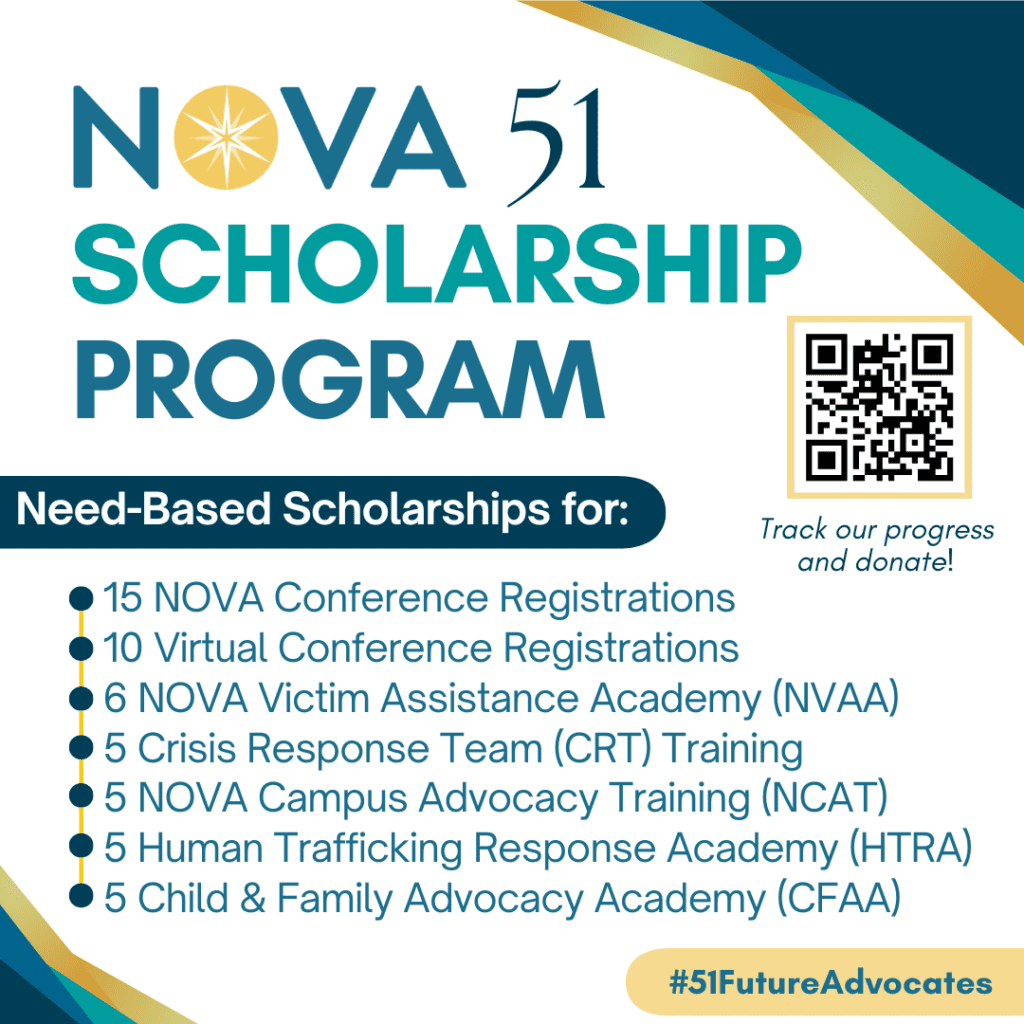Honoring Survivors of Crime and Advancing Their Rights
NOVA’s 2025 NCVRW Observation

NOVA Deep Dive: Tools for Community Kinship, Connection & Healing
Monday, April 7th at 1pm – 2pm ET | CLICK HERE TO WATCH THE RECORDING >
This NCVRW, NOVA wants you to reimagine what it looks like to cultivate healing through connection. Community is one of the most powerful resources we have and we are continuously investing in free tools to help our members and network connect and grow together! Join us to learn about the many free tools and resources that NOVA offers to meet needs across a wide spectrum of advocacy and crisis response services.
Advocate Appreciation
All Week: Send a free e-card or post a public message on our Advocate Appreciation Wall
Kick off NCVRW by celebrating the heart of victim services: victim advocates! Show your appreciation by sending a free e-card to an advocate who has made a difference and leave a message on our Advocate Appreciation Wall to uplift and inspire the entire advocacy community. A simple note of gratitude can go a long way in recognizing their efforts. Let’s come together to honor and thank those who stand in support of survivors every day!
Thursday, April 10th at 1 – 2pm ET | CLICK HERE TO WATCH THE RECORDING >
The VAC in Action: Reflecting on the Impact of NOVA's Victim Advocacy Corps
In this panel discussion, moderated by Abrianna Morales, NOVA’s Victim Advocacy Corps (VAC) Program Manager, VAC Student Fellows and representatives from their field-placement agencies will reflect on and discuss the impact of NOVA’s VAC Pilot Program in their local communities. NOVA’s Victim Advocacy Corps (VAC), developed with funding from the Office for Victims of Crime, aims to elevate the next generation of leaders in victim services by providing college students with victim advocacy training, credentialing, mentorship, and a nine-month, paid field-placement in a local victim service agency. As of Spring 2025, 14 VAC Student Fellows, representing six institutions of higher education, have been placed and making a difference at local victim service agencies across the country.
NOVA's Advocacy in Action Virtual 5k
Friday, April 11 (ALL DAY) | CLICK HERE TO REGISTER >
It’s time for you to get registered and ready to help raise awareness and promote the advancement of rights of crime victims!
This virtual 5k is a personal challenge that you can complete at any location you wish, you can get a group together or participate by yourself. There is no cost to join. The important part is to get out in your community and have fun. Your action creates change!
Keep scrolling for more info on the 5k…
Thank you to our 5k sponsor, QuickSeries! Learn more about QuickSeries and NOVA’s Trauma-Informed Responses Pocket Guide here!
NOVA's Advocacy in Action Virtual 5K
Thank you to our 5K sponsors, QuickSeries!
STEP 1: REGISTER
It’s time for you to get registered and ready to help raise awareness and promote the advancement of rights of crime victims! Registration is FREE!
This virtual 5k is a personal challenge that you can complete at any location you wish, you can get a group together or participate by yourself. There is no cost to join. The important part is to get out in your community and have fun. Your action creates change!
STEP 2: GET YOUR RACE SWAG
By purchasing our Advocacy in Action shirt, you’ll be supporting NOVA’s #51for51 scholarship program, which is committed to shaping a more accessible, equitable and inclusive future for the victim assistance movement and our future leaders. Your purchase supports #51FutureAdvocates.
Orders must be placed by March 18th in order to receive them in time for the 5k.
STEP 3: DONATE
We hope you’ll join us and show your support for your community and the future of advocacy by donating $5, $51 or $150! CLICK HERE TO DONATE.
CREATE YOUR OWN FUNDRAISER
Not in a financial position to donate? We understand!
It is quick and easy to start your own fundraiser to show your support and raise awareness of the #NOVA51for51 Campaign. By creating a free fundraiser, you can share with your community why victim advocacy and crisis response matters to you!
- Click the button above
- Complete the form with your campaign name, goal, personal message, and photo.
- Follow the prompts and access your custom fundraiser page.
- Share and contribute to the lives of #51FutureAdvocates and countless survivors.
QuickSeries proudly supports NOVA’s mission by providing engaging, accessible materials that empower survivors and advocates. Our print guides, outreach formats, and mobile apps deliver vital information on victim advocacy, crisis response, and personal safety. Together, we’re making critical resources more accessible—because knowledge is power in the journey to healing and justice.
Have you seen NOVA’s Trauma-Informed Responses QuickSeries Pocket Guide?
This guide teaches the importance of trauma-informed advocacy and recognizing the unique experiences each individual has faced. Readers will better understand how a person’s past experiences shape current behaviors and coping mechanisms while helping them heal and build resilience.
Recognizing the whole person
Signs and symptoms of trauma
Providing support to individuals who have experienced trauma
NOVA's #51for51 Campaign
In honor of our 51st Anniversary, NOVA is giving 51 need-based Scholarships to #51FutureAdvocates so they may attend a wide range of professional training programs to begin their victim assistance careers.
We are creating new pathways for aspiring victim assistance professionals and survivor-advocates by removing financial barriers to accessing skill-based trainings. Fund a Future Advocate: Donate Today!
“I love NOVA’s NCVRW events and this year was no different! The speakers and content are all so inspiring and help me improve my response as an advocate.”
– 2023 NCVRW Attendee
Join us for NCVRW every April
NOVA observes National Crime Victims’ Rights Week during April each year. We offer free webinars and virtual events highlighting survivors of crime and offer opportunities for engagement and connection for those working in the field of victim advocacy, including NOVA’s Annual Virtual 5K.
Sign up for email updates to receive info on future observations.
Honoring our past, creating hope for our future.
Since 1981, NOVA has promoted and advanced victims’ rights during National Crime Victims’ Rights Week. Listen to our chat with NOVA founders and leaders in the victim rights’ movement, Dr. Marlene Young and Mr. John Stein, sharing the history of National Crime Victims’ Rights Week and their vision for the future of the movement.
More about NOVA’s NCVRW Observation
All of the events and opportunities we offer throughout NCVRW are open for anyone to register and attend.
No. All events and opportunities are free.
Attendees of NOVA’s NCVRW webinars and educational workshops will receive CEUs.
Led by the Office for Victims of Crime (OVC), National Crime Victims’ Rights Week (NCVRW) has challenged the Nation to confront and remove barriers to achieving justice for all victims of crime since 1981. During NCVRW, we celebrate the accomplishments of the victims’ rights movement and reflect on how far we have come. Learn more on OVC’s NCVRW webpage.
To ensure that they can participate fully in the criminal justice process, every jurisdiction in the United States gives victims rights in criminal cases. Learn more on our Victims’ Rights and Public Policy page.







